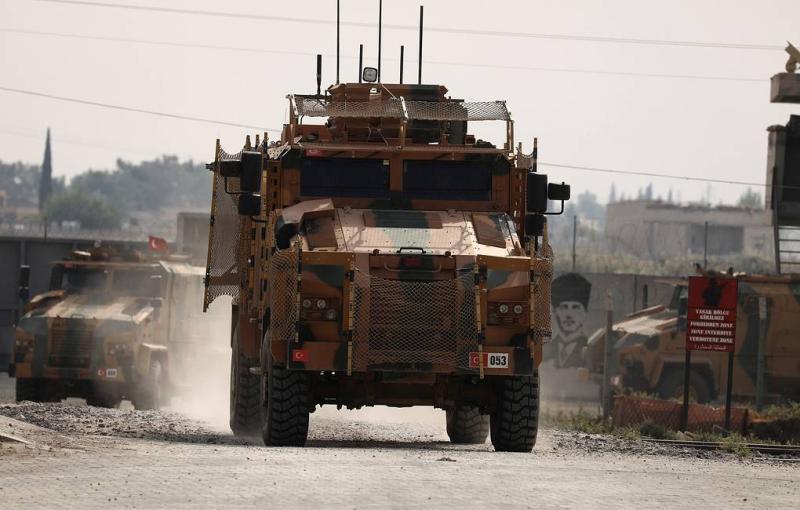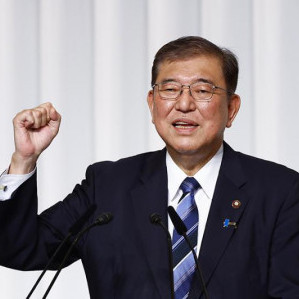
© REUTERS/Huseyin Aldemir/TASS
Top stories from the Russian press on Thursday, December 29th, prepared by TASS
Top Russian, Syrian, and Turkish defense officials meet in Moscow, what is the future of China’s support for Russia and Washington is going to continue its anti-Kremlin policy. These stories topped Thursday’s newspaper headlines across Russia.
Vedomosti: Russian, Syrian, Turkish top brass meet in Moscow
On December 28, Moscow hosted trilateral talks between Russian, Syrian and Turkish Defense Ministers Sergei Shoigu, Ali Mahmoud Abbas and Hulusi Akar, the press service of the Russian Defense Ministry reported. Simultaneously, a meeting was held between the chiefs of intelligence of the three countries, Sergey Naryshkin, Hakan Fidan and Rafiq Shahadah.
On December 25, Turkey’s Daily Sabah newspaper reported that Ankara and Moscow were negotiating opening the air space over Syria for the Turkish air force in order to conduct a possible cross-border operation.
Turkey is not rejecting a ground operation against the Kurds either but first it wants to "clear the field" for it, says Senior Researcher at the Russian Academy of Sciences’ Primakov Institute of World Economy and International Relations Viktor Nadein-Rayevsky. That said, Ankara understands that before holding the operation, it is necessary to reach agreements with Russia whose military has been in Syria since 2015 at the invitation of the country’s official government. In particular, the Turks would like to avoid Russian air defenses counteracting their aviation, the expert notes. The other matter is that Turkey’s ground operation presumes the occupation of additional areas in northern Syria, in addition to those already taken over by the Turkish army and its proxy forces, but there Russia is unlikely to consent, the analyst points out. The fact that the meeting was attended by members of Syria’s military and intelligence gives hope that the occupation won’t happen after all and the Syrian Arab Army with Moscow’s support will ensure border security without Ankara’s intervention.
The discussion of a ground operation is rather an excuse to launch interaction, according to Kirill Semyonov, an expert with the Russian International Affairs Council. This agenda helps Damascus and Ankara save face after mutual accusations and impossible demands, the analyst notes. Now there is an important justification which will help offset those sharp corners that were hard to avoid, the expert thinks. Russia has been suggesting such a normalization format since 2019 when reviving the 1998 Syrian-Turkish Adana Agreement on joint measures against the PKK was at the foundation of restoring ties. Now there are new convenient circumstances to relaunch this process, Semyonov thinks. According to him, Russian efforts and mediation will make finding a compromise easier.
The expert thinks that there are many options for the normalization process. All the sides will benefit the most from resolving the issue of Manbij and Tell Rifaat by establishing complete state control there with the absolute disarmament of all local formations affiliated with the SDF/YPG/PKK. Syrian Kurds, however, may find their interests infringed on and reject further dialogue with Damascus but not all players can be satisfied in this situation, especially those who opted for the US as their sponsor and use the dialogue with Moscow and Damascus as a backup, the expert concluded.
Nezavisimaya Gazeta: Will China continue its balancing act between Russia and the West?
Ten months after the onset of its special military operation, Moscow will ask China for greater support at the upcoming dialogue between the leaders of the two countries, according to analysts in Hong Kong. In their opinion, the Ukrainian conflict moved Beijing toward rapprochement with Russia. That said, China is unlikely to abandon its neutral stance because it still intends to normalize relations with the US and its allies.
According to Li Mingjiang, assistant professor at Nanyang Technological University in Singapore, 2022 was a difficult year for Chinese diplomacy. Beijing was forced to tone down its anti-US disclosures in light of the Americans successfully hammering together anti-Chinese coalitions in the spheres of security, the economy and hi-tech. This task was made easier for the US by China’s benevolence to Russia in the issue of Ukraine. In 2023, Beijing will try to "repair" its relations with the West and the visit by US Secretary of State Antony Blinken early next year may open a door to this process.
Other experts, such as Zhao Ma, Associate Professor at Washington University in St. Louis, think that Moscow needs Beijing more than the other way around so it is unlikely that Beijing will turn more toward Moscow, especially since Putin does not have a military alliance similar to the Warsaw Pact while Russia’s economy amounts to slightly more than 1% of the global economy. That said, Russia remains an energy superpower. However, its role may diminish because many countries are reducing their dependency on Russian oil and gas.
What should be expected from the conversation between Putin and Xi? Scientific Director of the Russian Academy of Sciences’ Institute of China and Contemporary Asia Alexander Lukin told the newspaper that most likely it will be held in an online format. The expert also thinks that China’s stance on Ukraine has been shaped for a while and won’t change. "China says that it supports a peace resolution on a mutually acceptable basis and will reiterate it," the expert explained. He noted that China does not provide military support to either side but the economy is a different matter with China increasing purchases of energy products from Russia. He pointed out that China always acts in its own interests and does not recognize the US’ sanctions, considering them illegitimate. "However, if there is a threat of secondary sanctions, China will proceed with caution. It will either reject some projects or will implement them surreptitiously. For example, China adheres to the UN sanctions against North Korea but Chinese products are still being sold there," the analyst concluded.
Nezavisimaya Gazeta: US to cling to its anti-Kremlin course
In 2023, US President Joe Biden will have to confirm that his promise to run in the 2024 election remains in effect while the Democratic Party must show that it is still wagering on the octogenarian White House occupant. Additionally, following the midterms, a new group of legislators will usher in the 118th US Congress in January which may present difficulties for Biden because he does not have a Democrat majority anymore in either chamber. The main issues will be budget-related, however, this is unlikely to impact the volume of support for Ukraine.
"The White House won’t get automatic approval of financial plans as it used to because the House of Representatives plays a large part in the country’s budget. So the remaining presidential term will be more difficult for Biden than the first two years. The Republicans won't agree with many of his proposals and will try to block them as much as possible. That said, Americans are much more interested in their domestic affairs rather than in Ukraine or Russia," Director of the Franklin Roosevelt Foundation for United States Studies at Moscow State University Yury Rogulev told the newspaper. He predicts that rhetoric against Russia in Congress will remain the same and any changes toward decreasing support for Ukraine should not be expected from the Republicans.
Indeed, both Ukrainian President Vladimir Zelensky’s visit to the US during which he addressed Congress and statements by the Republicans show that those legislators who would support saving money on supplies to Kiev are in the absolute minority. The only issue is which legislative initiatives against Russia will garner support. The US Congress has quite a few, including draft bills on recognizing Russia as a sponsor of terrorism and on excluding it from the UN. Right now, those amendments to the 2023 US budget already approved by Congress which make it possible to confiscate the assets of sanctioned Russians and hand them over to Ukraine are the most pertinent for Moscow.
Izvestia: Russian crypto-exchange may appear in Q2 of 2023
The State Duma (lower house) may approve a bill on cross-border payments in cryptocurrencies in January or February of 2023, Chairman of the State Duma’s Financial Market Committee Anatoly Aksakov said in an interview with Izvestia published on Thursday.
"I hope that we will pass this bill in January-February and beginning in the second quarter of 2023 it will start to function. Currently, the document is being reviewed by the State Duma, and there are heated discussions over it," he noted.
According to the lawmaker, the main criticism of the bill is that following its approval there is a risk of a conduit emerging helping to move assets out of Russia legally and without any control. "So the participants of the discussion are suggesting spelling out certain additional norms to remove this risk and these amendments can be introduced in the second reading," he explained.
The legislator also did not rule out the emergence of a Russian crypto-exchange in the second quarter of 2023. "There are already platforms like this, they only need to be legalized and the rules of operation should be defined," he added.
Izvestia: Russians’ appetite for holiday spending revealed
The events of 2022 affected the way Russians plan to ring in the New Year. In 2022, 48% of Russian residents plan on a more modest celebration than last year, whereas 30% do not expect any substantial changes in their holiday spending and only 22% plan on all-out festivities, according to Dolyami, Russia’s first co-payment service. The same applies to holiday presents — 59% of those polled plan on reducing their spending. According to experts, while the income of citizens was dropping this year, their emotional state was changing as well - more than half of Russians encountered stressful situations in 2022. However, according to some surveys, toward the end of the year the mood of Russians has somewhat improved which affected their desire to spend more money.
Head of the Laboratory of Social and Economic Psychology at the Psychology Institute of the Russian Academy of Sciences Timofey Nestik said at a conference on the impact of external shocks on the Russian economy that the comparison of the results of representative polls conducted in early February and in November of 2022 revealed a "paradoxical" increase in social optimism of more than 10 percentage points.
This is confirmed by other experts. According to the Federation of Restaurateurs and Hoteliers of Russia, Russians did not decrease their spending on restaurants, on the contrary, it has even somewhat increased. This is due to the reduced number of foreign trips this year - people started to frequent restaurants more and are ready to hold their New Year’s celebration there, says the Federation’s Vice-President Sergey Mironov.
"This year, despite its unpredictability, has not significantly changed Russians’ preferences when purchasing New Year’s gifts. Since the assortment matrix was evened out following the summer drop in products in some categories, now Russians have a sufficiently vast selection," President of the Association of Internet Trade Companies Artyom Sokolov told Izvestia. According to him, the most popular presents traditionally include gift sets of sweets, learning games for children, perfume, jewelry and gadgets.









